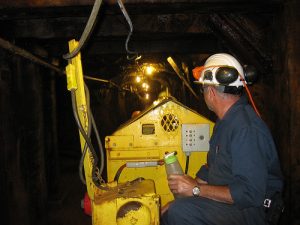B.C. Minister of Mines “mocked” public pleas
by Alex Watkins (News Writer)
The impending completion of a six-year pilot project that could seriously affect the future of British Columbia’s landscape has environmentalists across the province concerned. The Aggregate Pilot Project, or APP, was initiated by the Minister of State for Mines in 2004, and was intended to investigate and make recommendations for changes to gravel mining under the Mines Act, which has increasingly proven to cause tensions between mining operations and local communities.
Specifically, tension has stemmed from the fact that the Mines Act currently overrides all other legislation, essentially leaving communities powerless to fight the will of mining companies. Because of this, gravel pits have often been allowed to be situated in environmentally sensitive areas and next to residential neighborhoods.
According to Walter Neufeld – who manages a development company in BC and Alberta and is a strong APP critic – the Mines Act is more powerful than legislation relating to the “Environment, fisheries, forestry, [and the] community…[so] there is nothing that a community can do to stand up to the Mines Act, including local bylaws. They override everything.”
With the introduction of the Mines Act “there didn’t seem to be any rules governing the permitting of gravel pits… [and] conflicts… were exacerbated over the years until the government finally decided to reform the Mines Act through what they call the Aggregate Pilot Project,” Neufeld said.
The project involved the formation of a board of “some elected individuals of electoral areas and the gravel industry and the mines ministry.” The APP was to gather relevant data and draft a list of recommendations to be presented to the board, at which time the board was to decide whether or not to implement the APP’s recommendations.
However, research conducted by the Area C Environmental Steward Society (ACESS) discovered “that the gravel industry’s agenda had been published prior to the APP being initiated and that agenda is almost verbatim in that project.” In fact, many believe that the final document drafted by the APP doesn’t address the community conflicts it was meant to solve in the first place.
Neufeld pointed out the problem of giving the community such a comparatively short time to consider a proposal that has been years in the making. “The gravel industry [and] the Ministry of Mines sat together for six years to bring this product, this document to fruition. They’re giving local communities two hours to respond to it, and the communities are not being properly advised.”
ACESS asked that all residents in the Fraser Valley Regional District be notified of the APP public information meetings, be supplied with background information and be notified of the importance of attending. ACESS suggested that this be achieved via mail-outs. The request was rejected, and the APP cited the costliness of distributing the approximately 14,000 mail-outs as the reason. Instead, the meetings were advertised in local newspapers.
It has been suggested that the input of the public does not actually need to be given any consideration. In fact, according to Neufeld, the Minister of Mines “mocked” the request for a guarantee “that the public input be used to amend and remedy the flaws in the APP… he said by law they have to have these public input sessions [but] they’re not required by law to take any of the input from those public meetings seriously, and they’re not required to put into practice any of the input at all.” The APP presentation plan lists no further steps to be taken after the public consultation has taken place.
Neufeld emphasized the importance of the APP’s decision because “the Minister of Mines is on record that he wants to roll this initiative across B.C. if it’s accepted.” He explained: “We worry about the possibility that it will be accepted and implemented as is. It does have some positive features, but unless they fix some of the faults in it, it’s going to be a real problem. The inheritors of that problem [are going to be] young people.”
Neufeld believes that all individuals should be concerned about the outcome of this project, regardless of whether or not they currently live in areas that are directly affected by it. “This is a re-sculpting of our landscape. You will see less…local farming, you will see less pristine landscapes in environmentally sensitive areas. They’re working, with the APP, they’re working to industrialize many of these corridors where you and your friends go swimming and fishing and hiking and biking…it’s a downward spiral.”
Neufeld encouraged anyone interested in getting involved in his cause to contact him at: highview@telusplanet.net.



